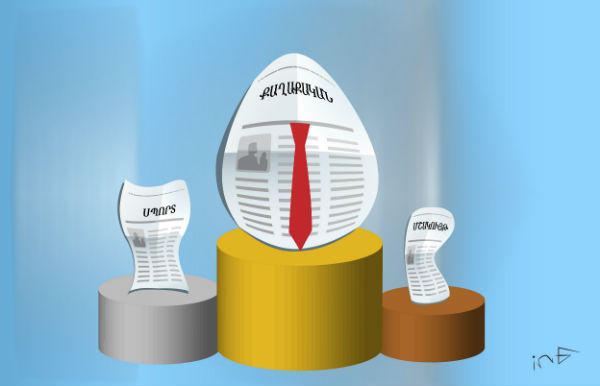
Last time we talked about the current state of Armenia’s print media, concluding that at this time it is under a real threat by online news media, if we overlook the fact that print media has long lost to online news outlets in terms of printing quantity.
I’m already repeating myself, but this is due not so much to the lack of topics or things to say as much to the alarming state of print media in Armenia, and from the hopelessness of escaping that alarming state, because it’s becoming clear that print media journalists puts more effort and energy into the online version of that same paper than she does for the print version.
And that too is understandable and explicable because the journalist herself sees and feels the irrefutability of the online’s advantage, especially in terms of urgency, as well as in terms of reactions on Facebook and elsewhere, because the main readers of print media are, relatively speaking, the elderly and those not having a computer, as well as those who don’t use computers.
And since this type of reader is decreasing day by day, also naturally declining is the hope of whether the print media will ever be in a condition to withstand online news outlets’ daily and hourly attacks.
But, nevertheless, this alarm is also entirely conditional and relative, because this triumph of online news outlets that’s taken off, negatively impacting print media’s circulation and reputation, has quite a positive impact on the development and emergence of new journalists, as well as on more established journalists reviewing themselves and their work and seeking new creative avenues, because online news outlets ensure totally equal conditions and quite an interesting competitive field for both rookie and established journalists.
And though those working journalism after Armenia gained independence, unlike your humble servant, did not work in journalism during the Soviet years; nevertheless, they also remember journalism during the Soviet years, when newspaper readers preferred the arts and sports section over other sections of the paper.
Us readers from the Soviet period would never imagine then that there would come a time when our readers would prefer political and domestic policy analyses over cultural and sports news.
During those years it was also impossible to suppose that our readers would read the leading and editorials of newspapers, but a fact is a fact: the contemporary Armenian reader, preferring the political over the cultural or sports, also readers editorials and leads.
And though the editorials and politically oriented articles in local newspapers are not always brilliant, the contemporary Armenian reader reads them, and the main reason for the imperfection of political pieces is the incomplete and inadequate level of Armenia’s political reality.
If one by one we recall our MPs and politicians, at most we cannot blame local journalists for lowering the political level in Armenia because those actually responsible for Armenia’s political level are politicians and not journalists, and if those holding political positions find themselves in ridiculous situations during their interviews, mostly they are the ones to blame — not journalists.
It’s a different matter, that sometimes some journalists try harder than necessary to present some of our officials and MPs who are already not that bright as more unintelligent. The opposite happens too: some journalists endow some partly intelligent MPs and politicians with absolute intelligence, waxing lyrical in golden Armenian and presenting them as supposed benefactors and saviors.
But this is a subject for a completely different conversation.
Armen Shekoyan
The views expressed in the column are those of the author's and do not necessarily reflect the views of Media.am.

Add new comment
Comments by Media.am readers become public after moderation. We urge our readers not to leave anonymous comments. It’s always nice to know with whom one is speaking.
We do not publish comments that contain profanities, non-normative lexicon, personal attacks or threats. We do not publish comments that spread hate.